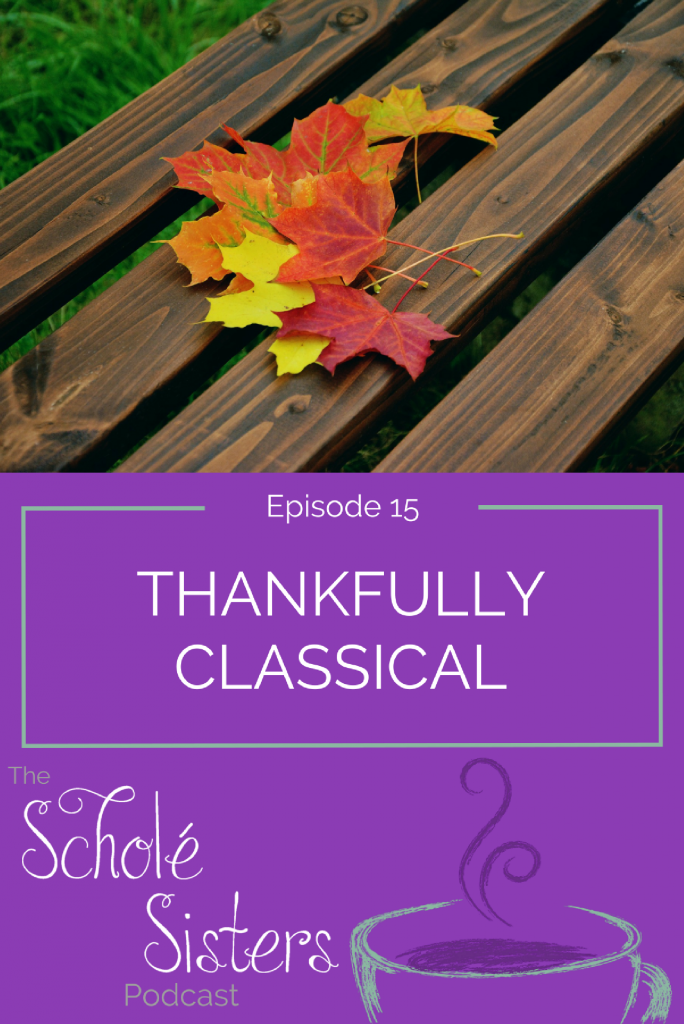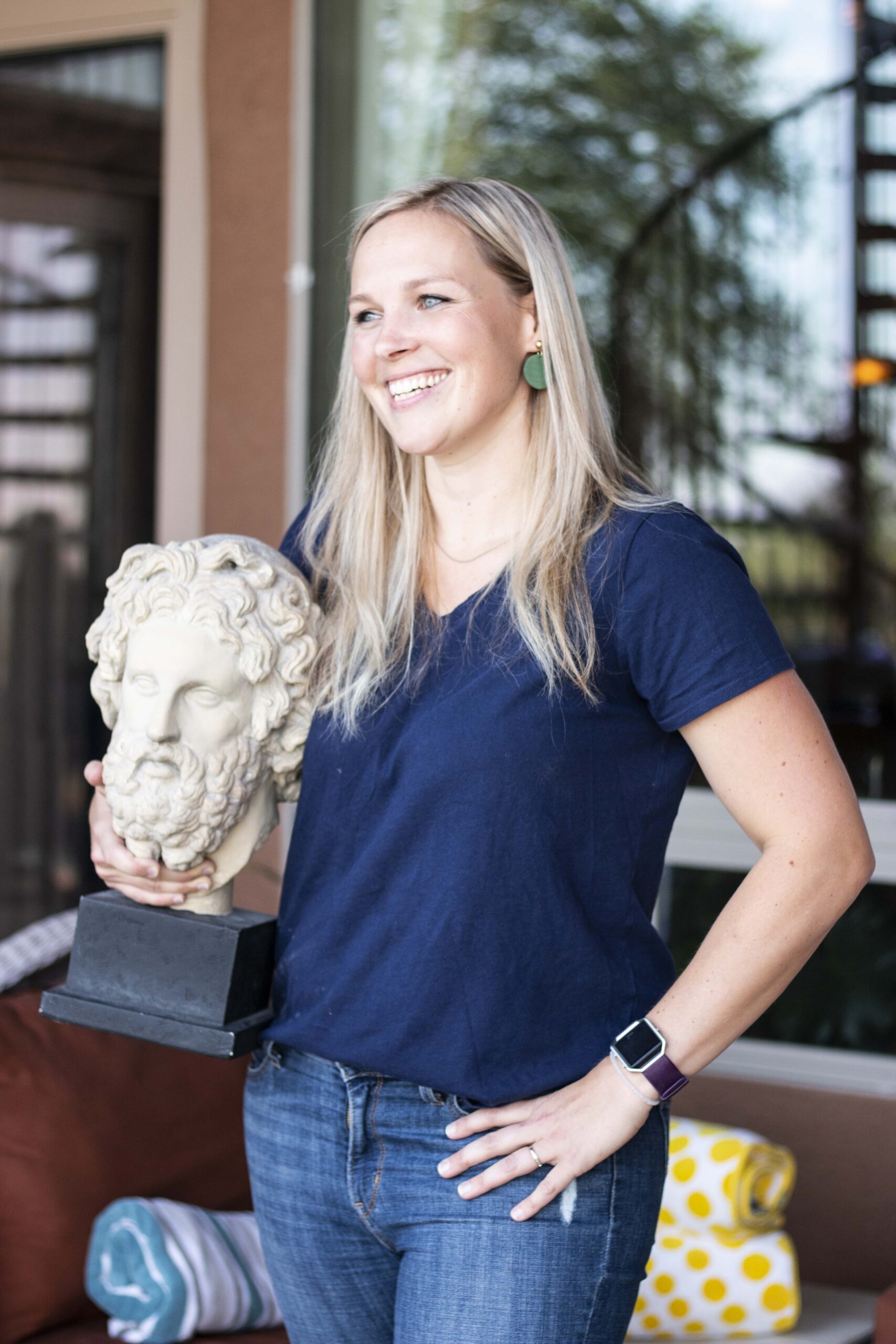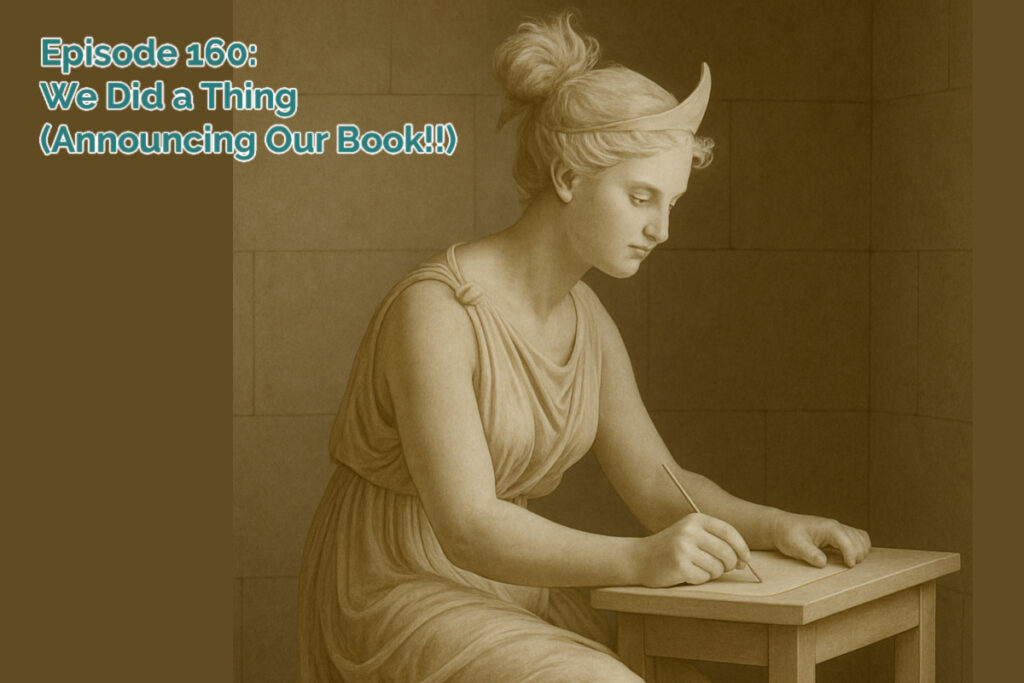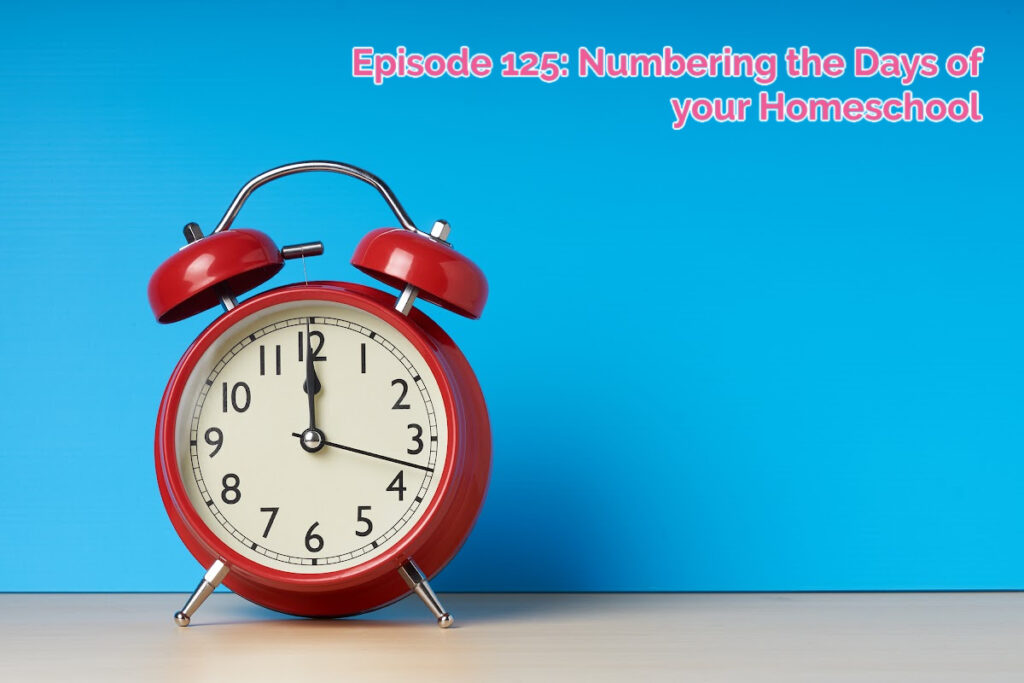SS #15: Thankfully Classical
Today’s show is all about thankfulness and Brandy is extremely thankful for Mystie. You see, we had recorded a different episode, but the recording had technical difficulties, and we weren’t able to use it. Mystie was willing to do a special recording, and we are all THANKFUL for her and that she was willing to do this so last minute!
In this episode, Mystie and Brandy first discuss the philosophy of thankfulness and the connections between gratitude and scholé. After that, they talk about all the long list of people and curricula and organizations that make us happily and gratefully classical.

Listen to the podcast:
Grateful for Classical Education
Scholé Every Day
- Mystie:
- 1000 Gifts by Anne Voskamp
- Brandy:
- An Old Fashioned Thanksgiving and Other Stories by Louisa May Alcott
Gratitude is Scholé
Gratitude is deeply tied to the heart of scholé. According to philosopher Josef Pieper in Leisure, the Basis of Culture, the essence of leisure is rooted in festival and worship. True celebration derives its meaning from thanksgiving and acknowledging God’s providence.
Thanksgiving, both in spirit and practice, becomes an act of worship. This link reveals a beautiful truth: at its core, rest is about a heart of gratitude and acknowledgment of God’s blessings.
Even cultural celebrations, such as Thanksgiving, can serve as moments to intentionally cultivate thankfulness. As families gather to reflect on provision and blessings, this holiday becomes an opportunity to redirect focus to God as the ultimate source of goodness. Hebrews 13:15 encourages believers to offer the “sacrifice of praise,” connecting thanksgiving to the act of worship.
Practical Gratitude Practices for Homeschool Families
Gratitude transforms the homeschool atmosphere, helping parents and children alike to reframe negativity. Here are actionable ways to foster gratitude in your family:
1. Daily Thankfulness Rituals
Start each day with a moment of gratitude during family prayer or morning time. Encourage each family member to thank God for specific blessings or events. This simple habit shifts the focus from complaints to gratitude, setting a positive tone for the day.
2. Thankfulness Journals
Create gratitude journals for your children—or use a shared family journal. Take a few moments during lunch or evening meals to write down one thing everyone is thankful for. Over time, this practice fosters an attitude of looking for blessings throughout the day.
3. Gratitude Trees
For a visual reminder, create a “gratitude tree” where family members add leaves labeled with things they’re thankful for. This is especially effective around Thanksgiving but can be adapted year-round.
4. Out-Loud Gratitude
Expressing gratitude out loud can combat negativity. If someone in the family is struggling with a bad attitude, encourage them to state something they are grateful for. Even a reluctant start can gradually lead to a shift in perspective.
Gratitude and Rest: Finding Scole in Homeschooling
Scholé, as a mindset of restful peace, thrives when infused with gratitude. The more we practice thankfulness, the more we reframe challenges and embrace a spirit of contentment. Homeschooling often brings stress and busyness, but cultivating gratitude can transform these moments into opportunities for connection, learning, and worship.
By incorporating daily habits of thanksgiving and modeling gratitude, parents can shape a home environment that not only fosters academic growth but also nurtures spiritual and emotional health. Gratitude becomes a bridge to true rest, connecting families to God’s peace in the midst of life’s demands.
Final Encouragement
As homeschool moms, the pursuit of restful living may feel elusive. But remember: rest is not about perfection or endless quiet time. It’s about adopting a mindset of trust, thankfulness, and peace. Start small, practice gratitude daily, and watch as the atmosphere of your home transforms.
Thankful for these resources
- The Babylon Bee
- Leisure: the Basis of Culture by Josef Pieper
- William Bradford’s Thanksgiving Proclamation
- George Washington’s Thanksgiving Proclamation
- Abraham Lincoln’s Thanksgiving Proclamation
- Primary sources for the first Thanksgiving
- Thankfulness Prompts:
- A person (dead or alive) who provides classical inspiration
- Mystie:
- Karen Glass
- Consider This by Karen Glass
- Brandy:
- Mystie:
- A book that changed your life
- Mystie:
- Norms and Nobility by David Hicks
- Brandy:
- Poetic Knowledge by James Taylor
- Mystie:
- A practice that saved your homeschool
- Mystie:
- Morning Time, specifically singing
- Brandy:
- Circle Time, specifically memory work
- Mystie:
- A principle that revolutionized your lessons or thinking or was otherwise life-altering
- Mystie:
- Education is a life (tied to education is for virtue)
- Brandy:
- Exposure breeds taste (John Hodges)
- Story competitors mentioned in this post
- Mystie:
- A curriculum you love
- Mystie:
- Brandy:
- An organization you’re indebted to
- Brandy:
- CiRCE Institute
- ACCS Conference Audio (also mentioned)
- Mystie:
- Brandy:
- A person (dead or alive) who provides classical inspiration
Listen to related episodes:
SS#160 – We wrote a book!
SS #148: De-Institutionalizing School (with Heather Olsson!!)
SS#142: Attention is a homeschool essential
SS #125 – Numbering the Days of Your Homeschool

Be a part of the conversation!
Discuss this podcast with other moms inside Sistership.
Podcast: Play in new window | Download







What a magnificent episode – all the more inspirational because it was a spur of the moment conversation!
Here’s a link to WiIlliam Bradford’s first Thanksgiving Proclamation:
http://www.appleseeds.org/thankgv6.htm
I want to agree wholeheartedly with the praise given by you wise women regarding Karen Glass and Cindy Rollins. It has been brilliantly articulated, so I will not try to advance that further.
I’ll consider your prompts and come back when inspiration strikes. Finally, I’m thankful for – the Schole Sisters! Thanks for inspiring us all!
Thank you! William Bradford’s was the one I had trouble finding for some reason, and then I forgot to come back to it later. ♥
I look forward to reading your answers to the prompts. 🙂
Weird – I’m still not getting notifications to replies from scholesisters. I just popped over to share my answers to the prompts and saw your response. Glad to help with the Bradford Proclamation. That’s what Pretend Research Assistants are for:).
I will try not to be too repetitive with my responses, although some are unavoidable:). Another person who provides classical inspiration for me is the inimitable Andrew Kern. Book that changed my life was Towards a Philosophy of Education by Charlotte Mason (or maybe For the Children’s Sake since that is what led me to CM’s 6th Volume?). Life-changing principle is Charlotte Mason’s Great Recognition – that all knowledge is inspired by God. I’ll name AmblesideOnline as both the curriculum I love and organization I am forever indebted to for its influence on my life – AO itself but more particularly the amazing women (and their families!) behind it.
This was fabulous!! So encouraging! I’m so thankful for you all and really as I was thinking back, Sarah Mackenzie is the one who changed my mind about classical education. The people I knew in real life made it look so hard and elitist that I wanted nothing to do with it. So we called ourselves “Charlotte Mason unschoolers.”. Lol. Sarah’s RAR and introducing me to Andrew Kern, Cindy Rollins and then Brandy has indeed changed my life!
I almost forgot, Brandy, thank you for sharing about your negative child!!! I have one of those who honestly makes me wonder how long I can homeschool her. We do these thankfulness exercises occasionally, but not consistently, Lord willing, that is going to change starting today!!
I love this, Sharron! ♥
I am sorry you have a negative child — I know how hard that can be. I hope the consistency in gratitude works like magic!
I ♥ AO. But you already knew that. 😉
Thanks Brandy! Me too!
I have so enjoyed this episode. “Because that’s how electricity works.” Ha! Beyond loving your sparkling, shining, soulful conversation, the wisdom and resources are inspiring—so immediately useful.
I’d love it if sometime you talked a bit in the nitty-gritty portion about hymn resources. A friend and I have tried to incorporate hymns into our home lives because our churches just use modern praise and worship music, and we want our kids to grow up with that rich musical history. But most of the hymns I find for sale on iTunes are either too stiff and formal (heavy-handed organ, incomprehensible lyrics) or else dumbed-down beyond belief—cloying, all-unison kids choirs (sorry, kids, you’re great!), all the beauty and soul sucked right out. I found a few songs that I thought had a good union of being understandable and beautifully done, but not nearly enough. Do you use recordings? Just sing a cappella? Suggestions? I’ll list a few hymn versions that I thought fit the bill, even though one doesn’t have lyrics at all. Again, thank you for Schole Sisters!
[Hymn; Artist; Album]
This Is My Father’s World; Alli Rogers; Why We Sing
Come Thou Fount; Chelsea Moon & Uncle Daddy; Hymn Project, Vol. 1
All Creatures of Our God and King; Fernando Ortega; This Bright Hour
For the Beauty of the Earth; Chris Rice; The Living Room Sessions (so gorgeous but not so useful for teaching hymns to my four-year-old)
This album comes close: Rivertree Live; This Is Our Story: Hymns of Our Faith
Folksy and a little silly but still fun and continuing some more home-baked tradition: I’ve Got a River of Life; Hark UP Down Home Horns; Down Home With the Horns
A show on singing would be really fun! I will have to put that in our Idea Bank. 🙂
To give you a brief answer, though, I use piano or YouTube recordings in the very beginning, when we’re trying to pick up the tunes, but after that, we do acapella all the time. I think children learn to sing more in tune when there are only other voices in the room. Not that there is never a place for accompaniment, but in terms of daily singing acapella is something I think should be done at least part of the time.
Have you checked out the Children of the Open Air YouTube channel? It’s not exactly what you’re describing, but you might like it!
The website Hymns at Home (https://hymnsathome.com/) is relatively new and put together by an AO mom and dad to provide quality hymn resources for other AO families. It has quickly become one of my very favorite hymn resources and I am so thankful for the hard work they’ve put into their site!
Thank you for sharing this, Dawn — I had completely forgotten about this site!
I am just going to do some of the prompts. #1 Person: Sonya Shafer has greatly impacted me with her gentle spirit and her generous ways. The way she shares the CM homeschooling life is clear and practical, but she also understands what homeschool moms need to remember. “Make sure you leave margin. Don’t stretch yourself too thin. ” #2: Books that changed my homeschool were Catherine Levinson’s little books, A Charlotte Mason Education and More Charlotte Mason Education. I found these two little books at a yard sale the summer after a difficult homeschooling year, and I knew that CM was what I was looking for. #3: A principle that changed and saved my homeschool was the one I found at Mystie’s blog: Education is for virtue. God used that idea to show me how I had been missing the mark in my homeschool, and I have not been the same since. Thank the Lord! #4: A group or organization that has greatly impacted my school that I am extremely thankful for is A Delectable Education. I know it is not a big organization like Circe or CAP, but those ladies have done SO much to encourage me with their practical application of CM principles.
Oh, yay! Thank you for participating! Loved your answers. ♥ And also: back when CiRCE first influenced and encouraged me, they were tiny, too. An organization doesn’t have to be big to make a difference. 🙂